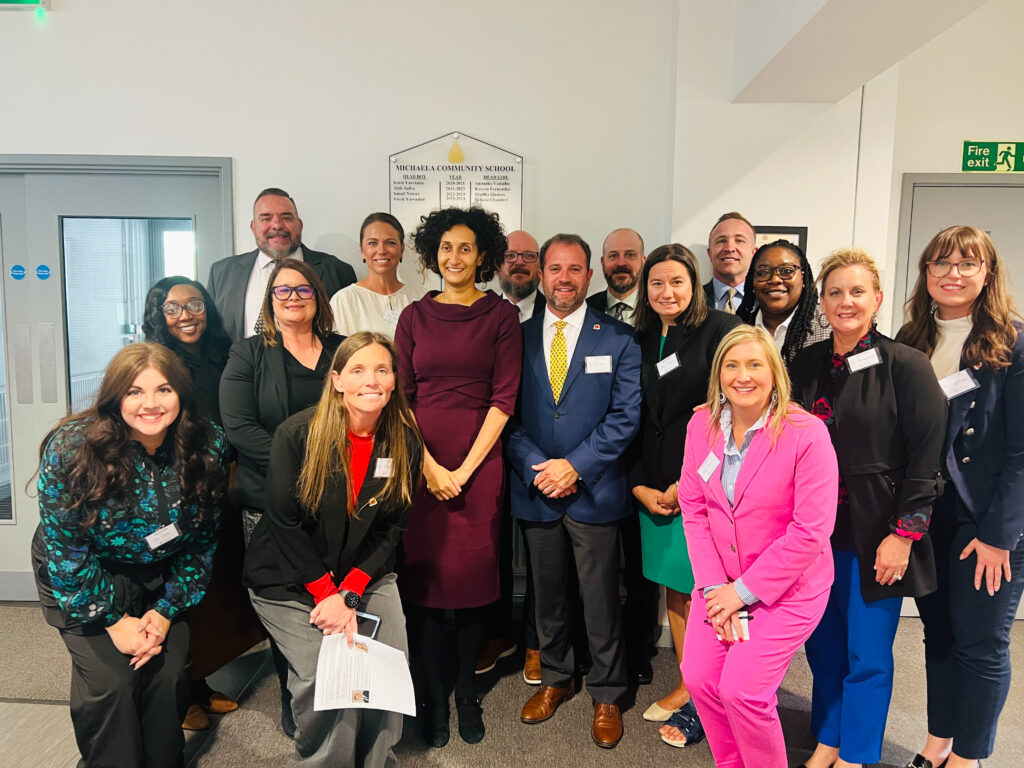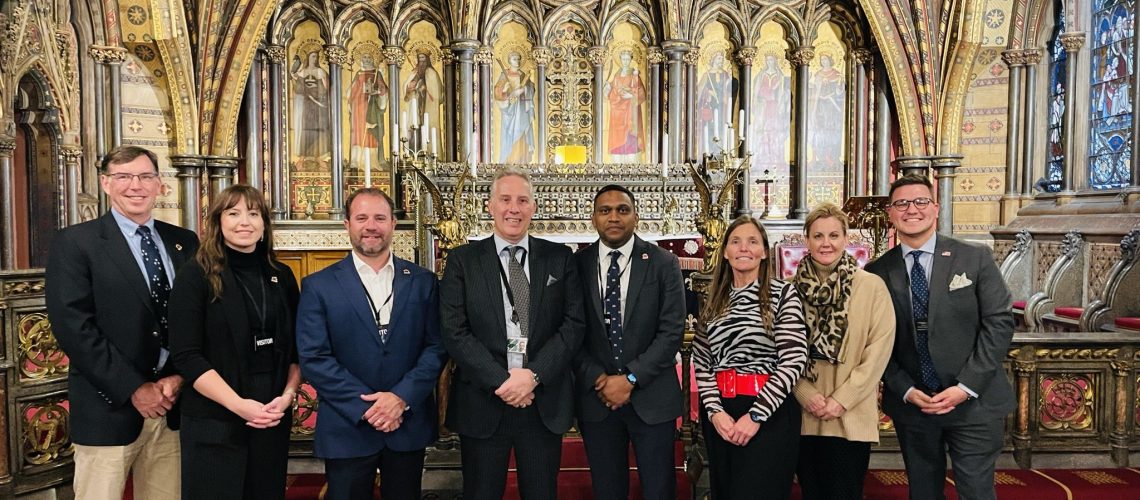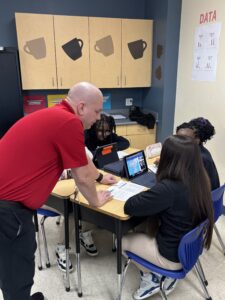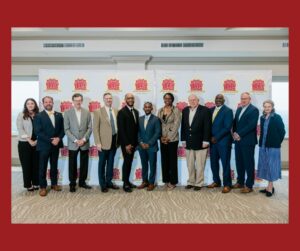COLUMBIA, SC – The Charter Institute at Erskine announced that it took a delegation of over 30 leaders to England to visit London-based charter schools to promote professional development, increased educator and student collaboration, and innovation in teaching, resulting in closer education ties between public charter schools in South Carolina and England.
“We are thrilled that the first international stop in our immersion program was to visit high-performing charter schools in London,” said Charter Institute Superintendent Cameron Runyan. “Our program enables us to share ideas, build collaborative professional development, and utilize technology to connect our teachers and students to their counterparts across the world. This first international trip really opened our eyes to the enormous opportunities we have to engage global partners,” said Superintendent Runyan.
“For more than 200 years, the United States and England have forged a strong bilateral relationship based on mutual respect and shared values. We have a shared history and appreciation of Western culture that is reflected in our educational values, the way we teach, and what we teach. We have stood shoulder-to-shoulder to defend democracy and freedom throughout two world wars. As more families in our state seek increased educational choices that best suit their needs, the time was right to learn more about the great strides British students have made over the past decade,” stated Superintendent Runyan.
A total of 31 people made up the South Carolina delegation, including school leaders, assistant principals and administrators, aspiring school leaders, and Institute staff. Trip participants included a cohort from the Institute’s Leadership Program, who previously visited high-performing public charter schools in Miami. The delegation visited three public charter schools in the London area, including The Michaela School, Wembley High Technology College, and Preston Manor. These schools are some of the highest-performing schools in England with top assessment results and shared innovative strategies that the charter leaders have brought back to South Carolina.
“Embarking on an international journey to London, fueled by curiosity and passion for education, was an unforgettable experience,” said Julianne Lang, School Leader for the Lowcountry Leadership Charter School. “Visiting three diverse international schools and engaging with Parliament ignited my enthusiasm for innovative leadership in education. Thanks to the impeccable coordination by the Charter Institute at Erskine’s Leadership Program, this trip wasn’t just an excursion, it was a profound opportunity for professional growth and networking. Every interaction, every moment spent exploring new perspectives, has enriched my understanding of leadership in education. These memories are not just souvenirs, they are invaluable treasures that will shape my approach to leadership for a lifetime,” concluded Lang. Read more in Ms. Lang’s blog post about the trip here.

The delegation met with the schools’ headmasters, educators, and students. For many of the participants, this was their first trip outside of the U.S. Learning how the government in England improved educational outcomes in mathematics was one aspect of the delegation’s visit, as the trip also focused on professional development and assessments. The delegation also had the unique opportunity to meet with members of Parliament to learn more about the legal environment impacting school choice, including MPs Ian Paisley, Dame Andrea Jenkyns, and Baroness Nicky Morgan.
The U.S. Department of Education’s 2022 International Strategy, entitled “Succeeding Globally Through International Education and Engagement,” notes that “an effective domestic education agenda must aim to develop a globally and culturally competent citizenry.”
U.S. Secretary of Education Miguel Cardona stated “International education is vital. It promotes mutual understanding and connection. It helps Americans from all walks of life better understand our world and engage with their neighbors who have different views and backgrounds. It enhances students’ global and cultural competency, gives insight and context for local, national, and global events, develops critical thinking, and fosters respect for diverse perspectives.”
In recent years, South Carolina has become a leading U.S. state in international economic investment and development. This has resulted in a need for more students to develop cultural awareness, international language proficiency, and receive a high-quality education to build successful careers.
The Profile of the South Carolina Graduate was developed by the South Carolina Department of Education and approved by the South Carolina General Assembly. It requires our state’s high school students to graduate with world-class knowledge and world-class skills.
The U.S. Department of Education’s International Strategy notes that strengthening our education system requires benchmarking the U.S. education system against other countries. Benchmarking helps education leaders identify strengths and weaknesses in our system and work with international partners to discern their professional development practices, training, and pedagogy.
According to England’s Department for Education, math and reading scores for British students have increased dramatically over the past 15 years, even during the pandemic. The 2022 Program for International Student Assessment (PISA) mathematics scores for 15-year-olds in the United Kingdom were higher than that of U.S. students and statistically above the Organisation for Economic Co-operation and Development (OECD) average. The 2019 Trends in International Mathematics and Science Study (TIMSS) also showed that the United Kingdom’s fourth grade mathematics average score was higher than that of U.S. students. During this same period, according to the National Assessment of Educational Progress (NAEP), U.S. national mathematics and reading scores have increased only marginally over the past 20 years.
No federal or state taxpayer funds were used to fund the travel and lodging of the South Carolina delegation to London. All funds used for participant travel costs were paid for by private sponsorships. The Charter Institute at Erskine is grateful for the financial support offered by the sponsors of the trip, including Haskell, White and Story, Cantey Technologies, Erskine College, Performance Charter School Development, Hayco, and Atwater Public Affairs.
The Charter Institute at Erskine is fulfilling its mission to build leaders to run high-quality public charter schools through its education and immersion program. By providing professional development and learning best practices through a connected network of global charter schools, the Institute is positioning its charter leaders to run successful schools in South Carolina.
Cohort participants from the Institute’s Leadership Program came from the following public charter schools:
- American Leadership Academy – Lexington County
- Ashley River Classical Academy – Charleston County
- Calhoun Falls Charter School – Abbeville County
- Cherokee Charter Academy – Cherokee County
- Clear Dot Charter School – Richland County
- Cyber Academy of South Carolina – Greenville County
- Greenwood Charter Academy – Greenwood County
- Lowcountry Connections Academy – Dorchester County
- Lowcountry Leadership Charter School – Charleston County
- Mevers School of Excellence – Berkeley County
- Midlands STEM Charter School – Fairfield County
- Montessori School of Camden – Camden County
- Royal Live Oaks Academy of the Arts and Sciences Charter School – Jasper County
- South Carolina Virtual Charter School – Lexington County
- Willie Jeffries School of Excellence – Orangeburg County




